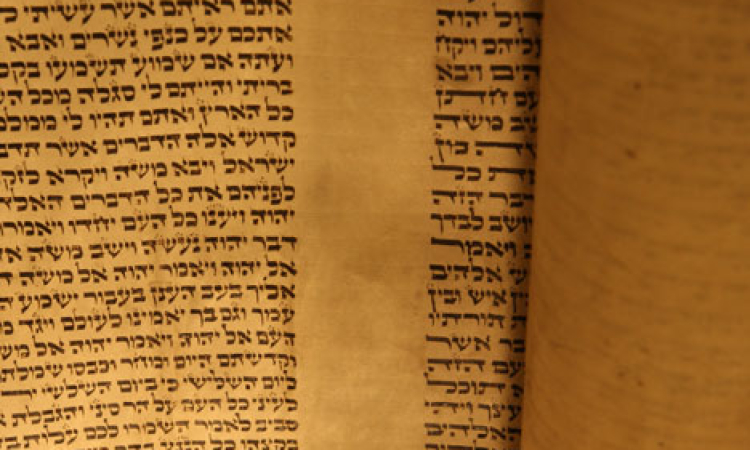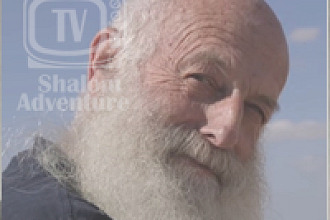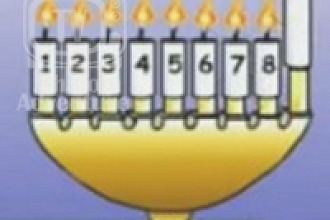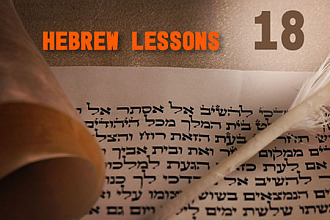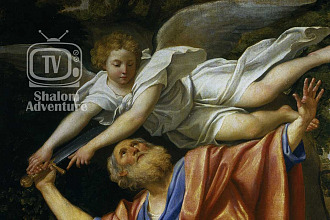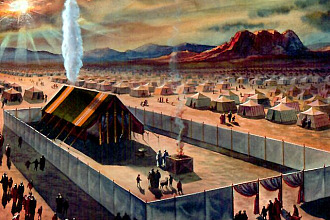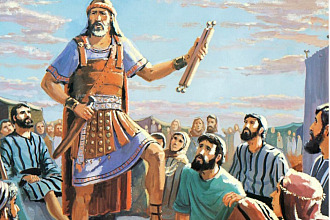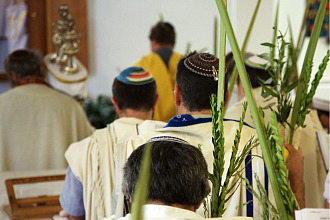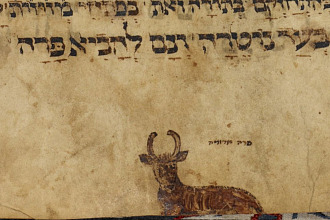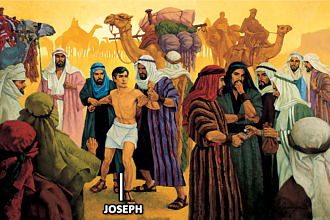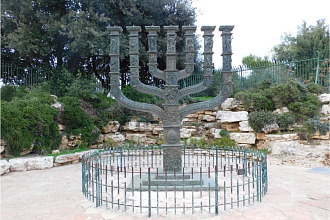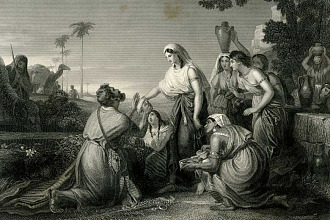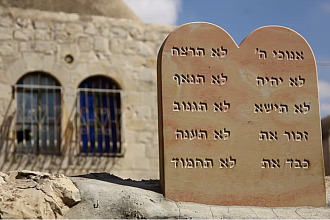Parasha for the Week: Vayigash: Genesis 44:18 - 47:27.
Haftarah for the Week: Ezekiel 17:15 - 28.
Besorat Yeshua: Mark 13:18 - 31.
Overview
With the discovery of the goblet in Binyamin’s sack, the brothers are confused. Yehuda alone steps forward and eloquently petitions Yosef for Binyamin’s release, offering himself instead.
As a result of this act of selflessness, Yosef has proof that his brothers are different people from the ones who cast him into the pit, and so he now reveals to them that he is their brother.
The brothers shrink from him in shame, but Yosef consoles them, telling them that everything has been part of G-d’s pla
He sends them back to their father Yaakov with a message to come and reside in the land of Goshen. At first, Yaakov cannot accept the news, but when he does his spirit is revived.
Yaakov together with all his family and possessions sets out for Goshen. G-d communicates with Yaakov in a vision. He tells him not to fear going down to Egypt and its negative spiritual consequences, because it is there that G-d will establish the Children of Israel as a great nation.
Seventy souls in total descend into Egypt, where Yosef is reunited with his father after years of separation. He embraces his father and weeps, overflowing with joy.
Yosef takes his father Yaakov and blesses Pharaoh.
The Children of Israel become settled, and their numbers multiply greatly.
Translation and Miscommunication
Rabbi Ozer Alport says, in the name of the Bait HaLevi, that Yehuda realized that the brothers’ original interactions with Yosef seemed bizarre and inexplicable. They told him that they came to buy grain, and he responded that they were spies. They answered that they were honest, and he told them that now they had proven his claim that they were spies. Since Yosef’s responses didn’t seem to correspond to the brothers’ statements, it occurred to Yehuda that perhaps the miscommunication was due to the translator, who wasn’t accurately relaying to Yosef the content of what the brothers had said, but was instead fabricating statements which they had never made.
In order to clarify whether this was the case, Yehuda asked for permission to review the entire dialogue directly with Yosef, without the involvement of the translator. In order to preempt Yosef from responding that he didn’t understand the Hebrew language that they spoke, Yehuda stated that Yosef was like Pharaoh (Genesis 44:18). If Yosef now claimed to be unfamiliar with their language, this would imply that Pharaoh didn’t know it as well, an inference that would be disrespectful to Pharaoh and therefore forbidden to make.
Speak to Someone’s Heart
The Torah states: “And Joseph said to his brothers, ‘I am Joseph. Is my father still alive?’ And his brothers could not answer him because they trembled before him” (Genesis 45:3).
How many words does it take for someone’s heart to change? How long must it take for someone to change? These words of Joseph were a rebuke to his brothers. They had thought evil of Joseph, and now they realized that his prophetic dreams of rulership and power were true. They instantaneously realized that they were previously wrong in their judgment of him. A mistake they had lived with for many years was cleared up with just two Hebrew words “Ani Yosef” - I am Joseph. The brothers changed their minds in just one moment.
There is no minimum word-count to another person’s heart. When what you say - or write - is powerful enough, you can reach people very quickly.
No Bitterness
Do we have resentment and anger when we have been hurt or cheated? Joseph was a great man. Although he is sold by his brothers, Joseph goes to great lengths to treat his brothers respectfully. Not only is he concerned with their possible humiliation, but he even thanks his brothers for selling him (Genesis 45:5-8). We can learn from Joseph’ story; he does not allow himself to be dominated by feelings of bitterness about the past. Rather, he emphasizes the positive aspects of the situation, to the extent that he is able to relate to his brothers with true warmth and respect.
May we learn to cultivate a warm and loving attitude toward everybody. May we learn to overcome resentments about the way we were treated in the past, rising above our own hurt so that we can see the ultimate good in every situation.
To the ancient Egyptian nation, God made Joseph a fountain of life, and through his integrity the life of that whole people was preserved. Joseph reunited his family, which brought about redemption for all of the Jewish people at that time. Joseph, through his bondage in Egypt and through his suffering and successes became a savior to his father’s family. In the same way God’s people of the time of the end will get a final redemption through Mashiach who will come one day to establish the kingdom of G-d. At that time the two sons of Yaakov, Yoseph and Yehudah, will be united for ever as one people of G-d; that is also the lesson of the text of the haftara “For Joseph (the stick of Ephraim) and all the house of Israel associated with it; and join them together into one stick, so that they may become one in your hand” (Ezekiel. 37:16-17).
Why Does Yosef Favor Benyamin?
Yoseph sends his brothers back to Canaan to get his father, but before doing so he presents each of them with a set of clothes. However, Yoseph gives his youngest brother Benjamin five sets of clothing and three hundred pieces of silver (Genesis 45:22). The Talmud (Megillah 16b) asks a very poignant question. How is it that Yoseph, a victim of jealousy, provoked his brothers by favoring Benyamin? Didn’t jealousy spur the hatred that led to the original calamity? Why didn’t he learn from past experience not to show favoritism? The Talmud explains that Yoseph was very calculated in his actions. He was alluding to a similar event that would occur in the future. After being saved from the gallows, Mordechai a descendent of Benyamin, miraculously rose to power and prestige. He was gifted with five changes of clothing as he left the palace of Achashveirosh (cf. story of Esther). Benjamin’s five changes of clothing were symbolic of a future sartorial gift that Benyamin’s descendent would one day receive. Some commentaries ask a powerful question. Obviously, Yoseph did not explain the deep meaning of his actions to his brothers. What then was gained by favoring Benjamin in front of them? Would the symbolic reference negate any ill feeling? Would some mysterious token resolve a problem that may have been simmering? Why does Yoseph, in the midst of the turmoil of his startling revelation, decide to make a ceremonial gift that favors one brother over the rest, in order to foreshadow an event destined to occur in more than a thousand years in the future? Could he have not saved symbolism for a more convenient setting?
The Jewish tradition says that Yoseph is telling us the secret of the Jewish people. Benyamin stood in shackles. Accused of stealing a magic goblet, he was humiliatingly sentenced with life-long enslavement to Pharaoh. Moments later, he was liberated and recognized with honor and integrity as the blood brother, from both mother and father, of the most powerful man in the world. Yoseph gives the former slave-to-be a special five-fold gift as an announcement to the world. With Benyamin, he declares the destiny of his people. Yoseph declares through Binyamin that today’s events are our manifest destiny. Due to the courageous actions of Yehuda, Binyamin the slave-to-be, walked away not with one change of clothing but with five. This was not a symbol of thousands of years to come, but rather a symbol of the ever-present character of the Jewish people.
The events of Benyamin in Egypt manifested themselves in almost direct comparison and beautiful symmetry with events that occurred centuries later in Persia. Mordechai the Jew, a descendant of Benjamin and by many accounts Yehuda, stood his ground under the greatest threats of death and humiliation. He defied Haman and walked away with glory. Yoseph’s message was no riddle; it was no illusion, and it was no mystical prophecy. It was the Jewish destiny. Courage in the trying times yields greatness. For the Jewish tradition, it was not a message only for the future. It was a message for today. That was a message all the brothers could appreciate—at that moment. It is a message we too can appreciate—right now.
They Were Shepherds
When Joseph coached his brothers prior to their first meeting with Pharaoh, he told them to emphasize that they were shepherds from time immemorial so that they would be sent to live apart in Goshen, for shepherds were an abomination to the Egyptians. Instead of bidding them to conceal that they were shepherds so that they would be more readily accepted, Joseph emphasized that fact. He realized that their ability to survive the Egyptian exile depended on their capacity to remain apart, and Goshen was well-suited to that purpose. Joseph told his brothers that he was going to inform Pharaoh, “My brothers and my father’s household, who are in the land of Canaan, have come to me,” hinting to them that they were not from the land of Canaan, but still in the land of Canaan, despite temporarily residing in Egypt.
Honor your Father . . .
The Torah states: “Then Joseph prepared his chariot and went up to meet Israel his father in Goshen. He presented himself to him and fell on his neck and wept on his neck a good while” (Genesis 46:29). Joseph was separated from his father, Yaakov, for twenty two years. Why was Yaakov punished with the loss of his son for so many years?
This was a punishment, measure for measure, for the twenty two years that Yaakov was away from his parents—according to the Jewish tradition, Yaakov was twenty years at the home of his father-in-law Lavan, and it took him two years to return.
This teaches us how great the mitzvah of honoring parents truly is.
Visiting them and attending to their needs brings great reward. It is the only mitzvah of the Ten Commandments which has a reward connected to it: “Honor your father and your mother so that you may live long upon the land which the L-rd your G-d gives to you.” (Exodus 20:12).
HAFTARAH: Ezekial 37:15 – 28
Parasha: Yosef and Judah are the two leaders of Israel. Yosef rules in Egypt; Judah is the leader of Israel listed as the first and the one who defends his brothers and especially Benyamin: “Judah and his brothers came to Joseph’s house” (Gen¬esis 44:14). “Then Judah stepped up to him and said, “O my lord, let your servant please speak” (Gen. 44:18).
Haftarah: A schism has divided Israel in two kingdoms, Judah in the South and Israel in the North. The Lord would like to see his people united again. Yoseph and Judah are the symbol of this unity. “Mortal, take a stick and write on it, “For Judah, and the Israelites associated with it”; then take another stick and write on it, “For Joseph (the stick of Ephraim) and all the house of Israel associated with it”; and join them together into one stick, so that they may become one in your hand (Ezekiel. 37:16-17). This text is clearly a Messianic text of the unity that will come as Y’shua holds us in His hands. David is presented as the future king: “My servant David shall be king over them” (Ezekiel. 37:24). But David died long time before Ezekiel; that’s why we understand that “David” is the Messiah, who is Son of David and therefore is called after the name of his ancestor David. The spiritual leader of God’s people will be the Messiah. “And they shall all have one shepherd” (Ezekiel. 37:24). The Lord gives many promises:
- They shall live in the land . . . forever.
- David shall be their prince forever.
- I will make an everlasting covenant of peace with them.
- I will bless them and multiply them.
- I will set my sanctuary among them forevermore.
- My dwelling place shall be with them.
- I will be their God, and they shall be my people . . . forevermore (Ezekiel 37:28).
Besorat Yeshua Mark 13:18 – 31
Parasha: Yosef is the type of the Messiah; after all his sufferings he saved his people from famine and death. “And Joseph provided his father, his brothers, and all his father’s household with food, according to the number of their dependents” (Genesis 47:12).
Besorah: Yeshua is coming back. Mark continues to give signs of his coming “But in those days, after that suffering, the sun will be darkened, and the moon will not give its light” (Mark 13:24). The description of the second coming of Yeshua is the ultimate realization of what we have read in the Haftara. “Then they will see ‘the Son of Man coming in clouds’ with great power and glory” (Mark 13:26).

